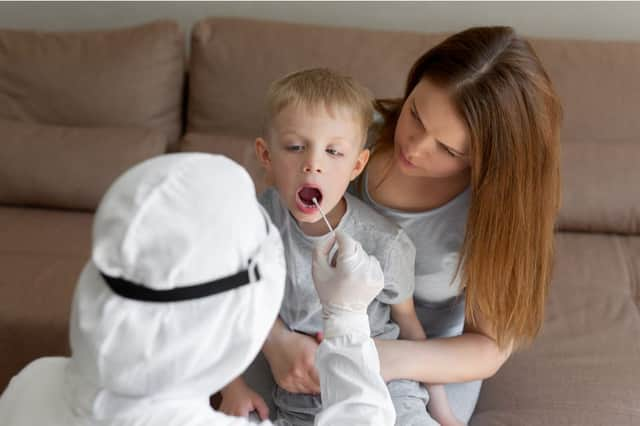Here’s how to book a coronavirus test for your child - and when not to get them tested


The return to schools in August in Scotland saw a huge surge in demand for coronavirus tests, rising by 300 per cent in one week for children aged between two and 17, with some schools around the UK having been forced to close due to an outbreak in cases.
The increased demand for tests has been attributed to the typical bugs and colds that are common at the start of a new term, with many children being away from classrooms and fellow pupils since March.
Advertisement
Hide AdAdvertisement
Hide AdBut when should children be tested for coronavirus - and how should you book a test?
Here’s everything you need to know.
When should my child be tested for coronavirus?
Parents have been advised to only take their children out of education if they are experiencing one of the three main symptoms of coronavirus.
These include:
- a high temperature
- a new, continuous cough – this means coughing a lot, for more than an hour, or three or more coughing episodes in 24 hours
- a loss or change to sense of smell or taste – this means they cannot smell or taste anything, or things smell or taste different to normal
Typical symptoms of a cold, such as a runny nose or a sore throat, are not considered symptoms of coronavirus, and as such, children do not need to be kept off school.
How do I book a test for my child?
If your child has coronavirus symptoms, you can apply for a test for them whatever their age.
Advertisement
Hide AdAdvertisement
Hide AdIf you are applying for a test for a child who is aged 13 or over, check with them first to ensure they are happy for you to get a test for them.
A young person can apply for a test for themselves from the age of 16.
There are a number of mobile testing sites across the UK where you can get a coronavirus test.
If you are unable to visit a test centre, you can order a home test kit using the self-referral form online via the government website.
Advertisement
Hide AdAdvertisement
Hide AdThese kits are delivered and collected by Amazon and Royal Mail, and they do not have access to the result or any health data.
The home test option is also covered in the booking process. If you complete a self-referral and order a home test kit, it will be delivered to you the following day.
A Royal Mail courier will arrive the day after to collect it and take it to the lab. The aim is that results will then be received via text within 48 hours.
You can also order a free home test kit from the NHS website.
Advertisement
Hide AdAdvertisement
Hide AdIf you are concerned about your child, you can use the NHS 111 online coronavirus service for children aged five or over. For children under the age of five, call 111.
How do I perform a test on my child?
The test involves taking a swab of the inside of a child’s nose and the back of their throat, using a long cotton bud.
Children aged between 12 and 17 can do the swab themselves, or someone else can do it for them. At some testing sites, a tester will carry out the test for them.
Children aged 11 or under cannot perform the test themselves, so a parent or guardian must conduct it for them, whether at home or at a test centre. You will be given instructions on how to do this.
Advertisement
Hide AdAdvertisement
Hide AdSome test sites will also have testers who will carry out the swab test, but this is only available for adults and children aged 12 and above.
Children may experience some brief discomfort when the swab touches their tonsils.
The NHS has a helpful video on how to conduct the test on children with as little irritation as possible.
Does the whole family need to be tested?
If you live with a child who has suspected coronavirus, you do not need to take a test unless you are also displaying symptoms.
Advertisement
Hide AdAdvertisement
Hide AdHowever, you will need to self-isolate until you receive the results from your child’s coronavirus test. In the event the test comes back positive, you will be required to self-isolate for 14 days.
A version of this article originally appeared on our sister title, The Scotsman.